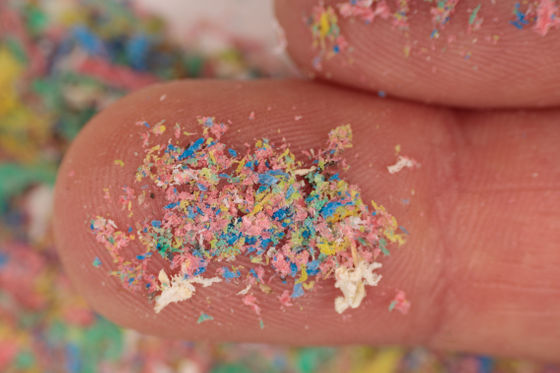Study finds 'microplastics' in all men's testicles, raising concerns about impact on fertility

Microplastics have been found in various places in the human body, including
Microplastic presence in dog and human testis and its potential association with sperm count and weights of testis and epididymis | Toxicological Sciences | Oxford Academic
https://academic.oup.com/toxsci/advance-article-abstract/doi/10.1093/toxsci/kfae060/7673133
UNM Researchers Find Microplastics in Canine and Human Testicular Tissue
https://hsc.unm.edu/news/2024/05/hsc-newsroom-post-microplastics-testicular.html
Microplastics found in human testicles could cause sperm counts to fall | Euronews
https://www.euronews.com/green/2024/05/21/microplastics-found-in-human-testicles-could-be-causing-sperm-counts-to-fall
'If we think about why people's fertility has declined in recent years, there must be some new factors at play,' says Professor Xiaojong Yu, an environmental medicine expert at the University of New Mexico School of Nursing, who studies the effects of various environmental factors on the human reproductive system.
After hearing from a professor at the same university that microplastics had been found in human placenta, Yu began research to see whether human testicles were also exposed to microplastic pollution.

The research team first obtained testes from 23 men aged 16 to 88 who died in 2016 from the New Mexico State Medical Examiner's Office, which stores autopsy samples for up to seven years. In order to compare with dogs, animals that live in the same place as humans, the team also collected testes from 47 dogs that had been neutered at nearby animal shelters and veterinary clinics.
The amount of microplastics was then measured using a technique called
Moreover, the average concentration of microplastics found in human testicles was 329.44 micrograms per gram of tissue, significantly higher than the average concentration found in placentas, and the average concentration in dog testicles was 122.63 micrograms per gram, meaning that there was about three times as much microplastics in human tissue as in dogs.
'At first I was skeptical about whether microplastics could enter the reproductive system, but I was surprised when I received the dog results, and even more astonished when I heard the human results,' said Yu.

Twelve types of microplastics were found in human and dog testicle samples, the most common of which was polyethylene (PE), the material used in plastic bags and bottles and a major source of microplastic pollution.
Because the human testicular samples had been chemically treated, it was not possible to measure sperm count. However, when the sperm counts of dogs were compared to the amount of microplastics, PE was unrelated, but the higher the concentration of polyvinyl chloride (PVC), the second most abundant microplastic, in the sample, the lower the sperm count.
According to Yu, PVC can release large amounts of chemicals that interfere with sperm formation, including endocrine disruptors. In addition, dogs have a similar sperm formation process and concentrations to humans compared to other animals such as rats, but their sperm counts are also declining. Therefore, Yu and his team believe that there is a common environmental factor behind the decline in sperm counts in both humans and dogs.
Yu said more research is needed to determine how microplastics affect sperm production in the testes. 'I don't want to scare people with this study, but I want to provide scientific data and make people aware that microplastics are all around us. We can avoid exposure to them or change our lifestyles and behaviors,' he said.
Related Posts:
in Free Member, Science, Posted by log1l_ks







